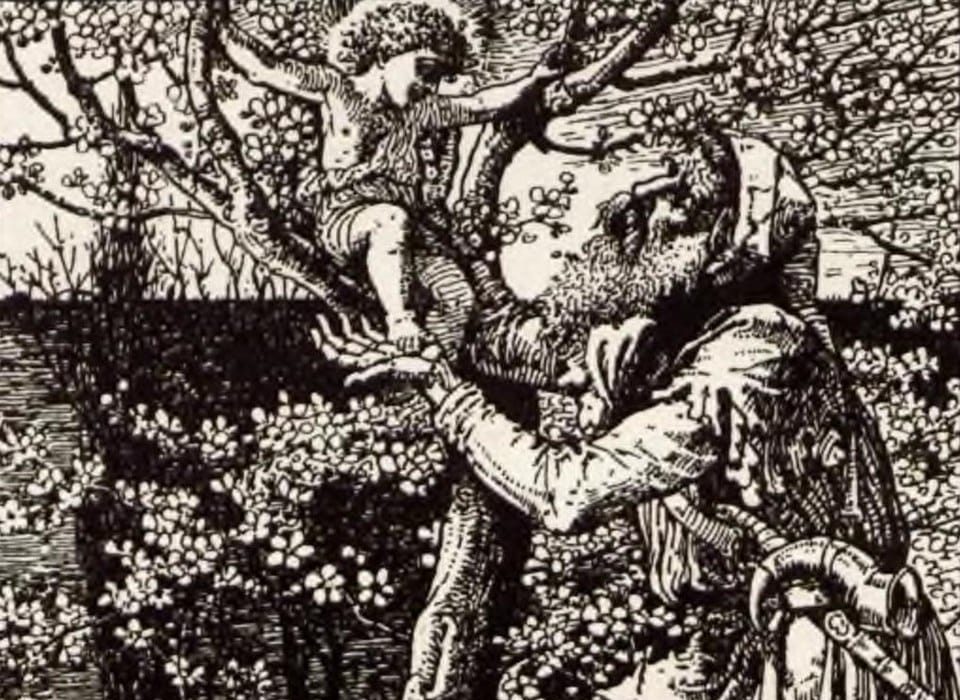As I had read Mark Twain’s A Connecticut Yankee in King Arthur’s Court, I couldn’t help but think of the many themes in the text. Twain manages to explore a variety of disparate ideas. These include science and technology in an age when superstitions reigned, and the violence of society throughout time. He also analyzes the permanence of history, and even parental sympathies and loved ones. In this post, I would like to examine just one of these themes: parental love.
Parental Love
Small Pox Episode
Throughout the book, our protagonist Hank Morgan finds himself in situations where individuals are either sick or dying at the hands of society. Nearby are their loved ones. For example, during a plague outbreak in the kingdom, King Arthur and Hank stumble upon a home afflicted with smallpox. A woman lies in bed, dying of sickness. King Arthur, meanwhile, retrieves her daughter from the eaves. He steps over the bodies of her other loved ones on the way out. He places the smallpox-afflicted child into the arms of her dying mother.
As Twain states: “She gave a sharp, quick glance at her eldest daughter, then cried out, ‘Oh, my darling!’ and feebly gathered the stiffening form to her sheltering arms. She had recognized the death rattle.” It is a poignant moment in a book otherwise rife in wackiness.
Later in the book, Hank expresses his own tenderness toward children. He states that childhood is marked by “mispronunciations” and “there’s no music that can touch it …” He also states that “one grieves when it wastes away and dissolves into correctness…” In other words, the loss of a child’s innocence is the real tragedy of life, and cherishing their naivety is the essence of loving parenthood.
Burned at the Stake and Accused of a Crime
Furthermore, a woman is burned at the stake while Hank and Arthur are held captive. The woman in question clings to her children before they are pulled from her and she is set ablaze. This horrifying scene illustrates the betrayal and heinous violence of the Middle Ages. In the scene, the woman is “fastened her to a post,” and “they brought wood and piled it about her.” Eventually, “they applied the torch while she shrieked and pleaded and strained her two young daughters to her breast; and our brute, with a heart solely for business, lashed us into position about the stake and warmed us into life” (Twain).
At one point, somebody accuses a woman of a crime for which she is guilty. However, the story reveals that she stole to afford food for herself and her child. In medieval Europe, “extenuating circumstances” did not exist, so the court’s have her hanged. Yet, before she is executed, she gives her child to a local cleric and thanks him for his generosity in protecting the child.
The scene plays out after “they put the noose around the young girl’s neck,” and then struggled to get the knot in the correct spot because “she was clutching the baby all the time, showering it with kisses, and holding it to her face and her breast, drenching it with tears, and half moaning.” Even the baby cannot understand what is happening, so it is “cooing, laughing, and kicking its feet with delight” (Twain).
Hank’s Paternal Love
Yet, as society changes around Hank, he himself experiences a personal transformation. Initially, he acts in a self-serving manner, leveraging his superior knowledge to gain power and influence. However, as he witnesses the consequences of his actions, Hank begins to question the ethics of his choices. Gradually, Hank begins to see the customs of the kingdom as something nuanced and stunted. This is in part due to the lack of innovation within society. This shift in mindset is a testament to the growth of his character. We see him wed to Sandy years after his initial adventures due to her love and adoration. Finally, Hank Morgan himself lies in bed, holding the narrator’s hand and deliriously calling out to his wife, Sandy, and his child, Hello Central.
Conclusion
Mark Twain’s A Connecticut Yankee in King Arthur’s Court is replete with themes of parental love and sacrifice. Hank Morgan, as a character, undergoes a transformation throughout the story. At first, he is portrayed as someone who is completely dumbfounded by the foolishness of the medieval kingdom. He views the society around him, with its superstitions and antiquated customs, with a mixture of disgust and disdain. As we know now, he had a paradigm shift and saw the light of love for his family.
As it relates to Mark Twain, he lost three of his four children before his own death. These included Langdon Clemens (19 Months), Olivia Susan Clemens (24 years old), Jane Lampton Clemens (29 years old). This paternal instinct is apparent in A Connecticut Yankee in King Arthur’s Court. Twain himself had already lost his son Langdon at this point in his life. In Twain’s writings, children were a poignant subject. Twain, too, had a deep care for his children and for the wonder that pervades them.
Twain stated in a letter to Dorothy Quick, daughter of Henry Stanhope Quick and a member of Twain’s Aquarium Club, on August 9, 1907: “I thought this was a home. It was a superstition. What is a home without a child?” Twain was referencing her absence, but in this we see Twain as having effecting for childhood youth as a sort of rejuvenate. His death is made all the more affecting as he held his only remaining daughter’s hand as he pressed on into twilight.
As it appeared in the San Diego Union-Tribune, and as stated on this blog, in his final moments, Twain held his loved one’s hand and uttered, “If we meet…” before falling asleep and dying. While we will never know what he wanted to say, the initial sentiment seems both loving and paternal.
Works Cited
Schmidt, Barbara. “Mark Twain’s Angel-Fish Roster and other young women of interest.” Twainquotes.com. Web. [Link to the source]
Project Gutenberg. (n.d.). A Connecticut Yankee in King Arthur’s Court. The Project Gutenberg eBook of A Connecticut Yankee in King Arthur’s Court, by Mark Twain. [Link to the source]





Leave a comment